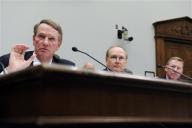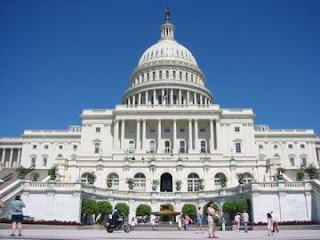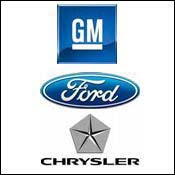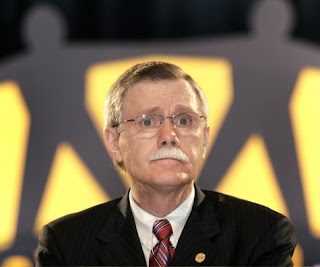US senators grill auto CEOs, GM-Chrysler deal eyed
* GM-Chrysler merger talks could restart
* Senior Democrats urge Bush to act using financial fund
* CEOs to appear before House committee Friday
* Fed to write Dodd about emergency loan power - source
* GM shares end down 16 pct, Ford closes 6.7 pct lower
By John Crawley and Kevin Drawbaugh
WASHINGTON, Dec 4 (
Reuters) - The chief executives of General Motors Corp and Chrysler LLC said they would consider restarting merger talks if needed to win their slice of up to $34 billion in emergency U.S. government aid.
"I would be very willing to look at it seriously," GM CEO Rick Wagoner told the Senate Banking Committee on Thursday, adding that merger talks earlier this year were dropped on concerns GM did not have the financing to merge with Chrysler.
Chrysler CEO Robert Nardelli said his job would likely be the first to go in a merger with GM, but if that would save Chrysler and its workers "I would do it."
Leaving their corporate jets in Detroit and driving to Washington, the chiefs of the Big Three automakers, including Ford Motor Co CEO Alan Mulally, pledged to refocus on higher fuel efficiency vehicles and lower production costs.
But they encountered deep skepticism among lawmakers who are suspicious of such promises, given the companies' past failures to ween themselves from gasoline guzzlers and to make innovative cars that consumers want to buy.
"I don't trust the car companies' leadership," said New York Democratic Sen. Charles Schumer at the hearing.
But in a comment reflecting many lawmakers' sentiments, he added, "We can't let the industry fail."
Most lawmakers want to help Detroit, but existing bailout proposals are stuck in a political gridlock between administrations, with President George W. Bush a lame duck, and President-elect Barack Obama waiting to be sworn in Jan. 20.
Underscoring the difficulty of getting an aid measure quickly through Congress, Senate Majority Leader Harry Reid, House Speaker Nancy Pelosi, Senate Banking Committee Chairman Chris Dodd and House Financial Services Committee Chairman Barney Frank sent a letter to Bush on Thursday urging him to use the $700 billion bank bailout program to help Detroit.
The administration has said that program is for helping the financial industry, but the four Democrats argued in their letter that it was becoming clear a failure of the auto companies would have a big impact on the financial sector.
Meanwhile, no congressional action on aid is expected before next week and perhaps not even then, despite dire warnings GM could collapse by the end of December without aid.
"Congress may consider legislation to provide assistance to the domestic automobile industry next week," said the letter to Bush.
The auto CEOs will appear before House Financial Services Committee on Friday.
DEATH SENTENCE
"Nothing concentrates the mind like a death sentence and we're looking at a death sentence if we don't respond intelligently and prudently," said Dodd at the end of a nearly six-hour hearing. "We're not going to leave town without trying."
Other lawmakers and the White House have called for modifying a $25-billion Energy Department program meant to assist automakers in developing technology to meet new fuel-efficiency requirements as a path to quick cash.
The Federal Reserve could also make a loan to automakers in some circumstances.
The Fed is expected to send a letter to Dodd on Friday explaining how it must obtain sufficient collateral under law to make any emergency loans, a source familiar with the letter told Reuters on Thursday.
Shares of both GM and Ford closed lower in a day of broadly bearish trading as Detroit's once mighty Big Three again came hat in hand to Washington. The same CEOs failed to secure help two weeks ago in an earlier round of congressional hearings.
This time the executives did not fly in on the jets that drew sharp criticism on their last visit. ID:nN04413085
GM's Wagoner arrived at the Capitol building in a light blue Chevrolet Volt electric prototype, but drove most of the way from Detroit in a Chevrolet Malibu Hybrid. Mulally came in a white Ford Escape Hybrid, and Chrysler's Nardelli arrived in a white EV electric vehicle.
The CEOs warned Congress again that a steep slump in car sales and sluggish world credit markets are threatening their futures and millions of good-paying jobs.
The GM-Chrysler merger idea was pressed by Utah Republican Sen. Robert Bennett and Tennessee Republican Sen. Bob Corker.
"I'd like to see that happen," Corker said. "I hope that's an outcome... our country cannot really deal with three separate automakers."
But United Auto Workers President Ron Gettelfinger questioned claims of cost savings from a merger and told the committee such a deal would bring "unbelievable" job losses.
BAILOUT COULD GROW
GM wants $4 billion and Chrysler $7 billion by year's end. GM also wants another $8 billion in early 2009 and a $6 billion line of credit if its cash position erodes further. Ford says it has enough funds now but wants a $9 billion line of credit.
An economist told the committee that the estimated $34 billion overall cost of the bailout cost could rise. Two weeks ago, the automakers had estimated they needed $25 billion.
The industry may need $75 billion to $125 billion to avoid bankruptcy and the companies may well return asking for more money later if they get the $34 billion they want now, said Mark Zandi, chief economist of Moody's Economy.com.
"I'm skeptical, doubtful that it's going to end at $34 billion," Zandi said.
On a combined basis, sales by the three automakers plunged 40 percent in November. The economy, already a year into recession, would suffer "severe and sweeping" damage if one or more of the automakers failed, Dodd said.
But Alabama Sen. Richard Shelby, the top Republican on the committee, voiced doubts shared by some senators on whether taxpayer funds are well-spent helping struggling businesses.
Shelby opposed the $700-billion bailout of Wall Street and the banks and "applying the same standard, I intend to oppose bailing out the Big Three auto manufacturers," he said.
WHITE HOUSE RESERVING JUDGMENT
The three companies submitted plans to Congress on Tuesday intended to show that they can still be viable businesses.
The White House said on Thursday it was too early to judge the viability plans and that the administration wanted to hear the testimony to Congress first. ID:nN04530567
In the hearing, the CEOs said they would accept some sort of oversight board as a condition of a bailout.
All three automakers dismiss filing for bankruptcy protection, but some lawmakers are exploring the possibility of conditioning federal aid on an speedy court restructuring of one or more of the Detroit manufacturers.
The head of the Government Accountability Office (GAO), the investigative arm of Congress, said Congress could consider a two-step approach with an immediate cash infusion to avert any collapse, followed by a program for distributing more loans over time based on certain criteria being met.
Gene Dodaro, acting GAO comptroller general, also said the Bush administration has legal authority to use money from its bank rescue program to help Detroit.
Shares of GM closed regular trading Thursday down 16.1 percent at $4.11, while Ford ended 6.7 percent lower at $2.66, both on the New York Stock Exchange. (Reporting by John Crawley, Karey Wutkowski and Rachelle Younglai in Washington, with Kevin Krolicki and David Bailey in Detroit. Writing by Kevin Drawbaugh; Editing by Tim Dobbyn)
















































